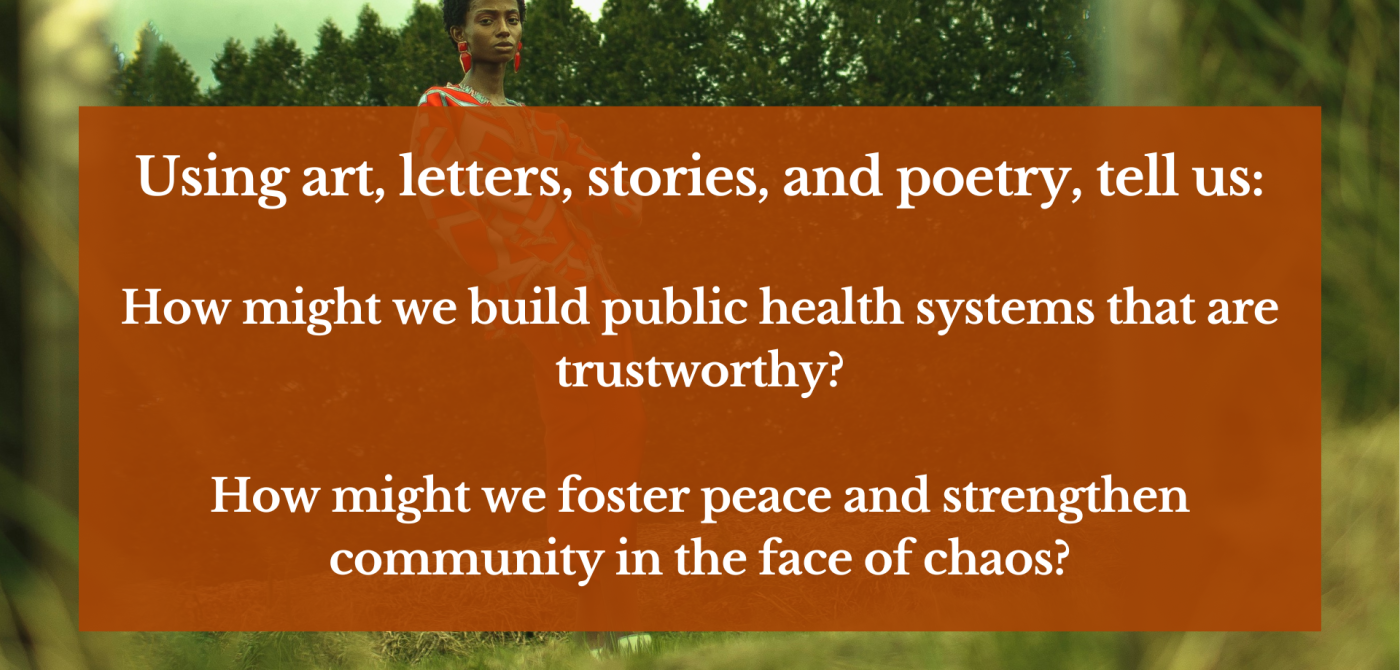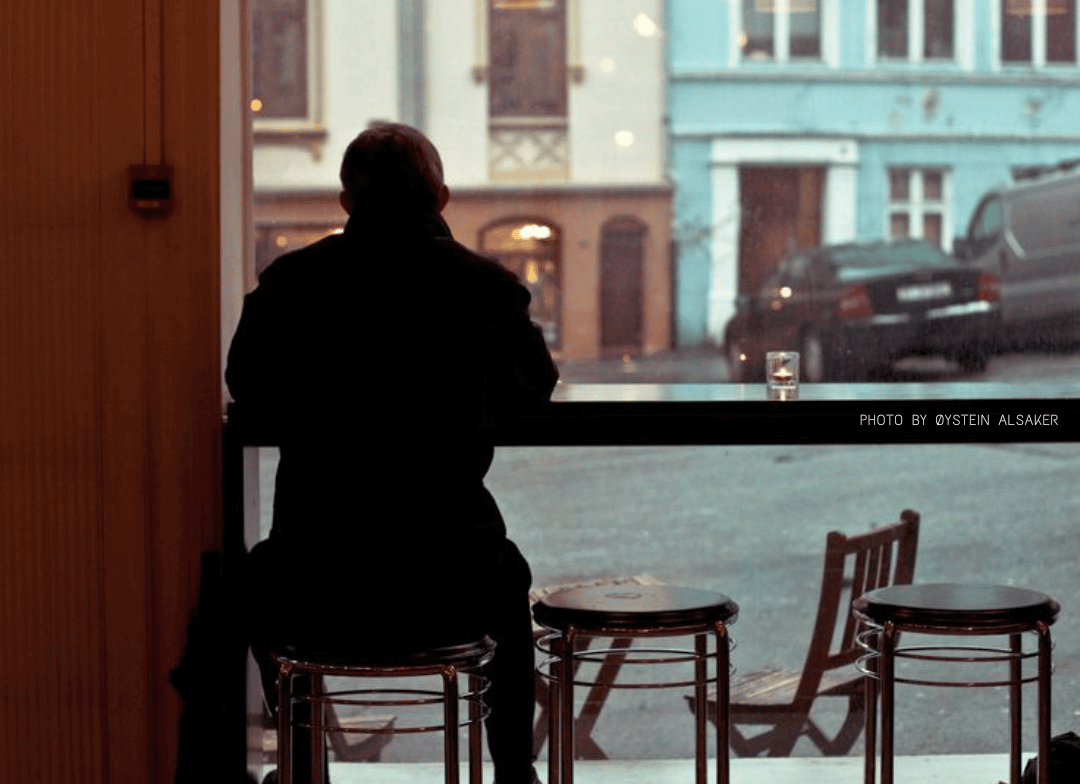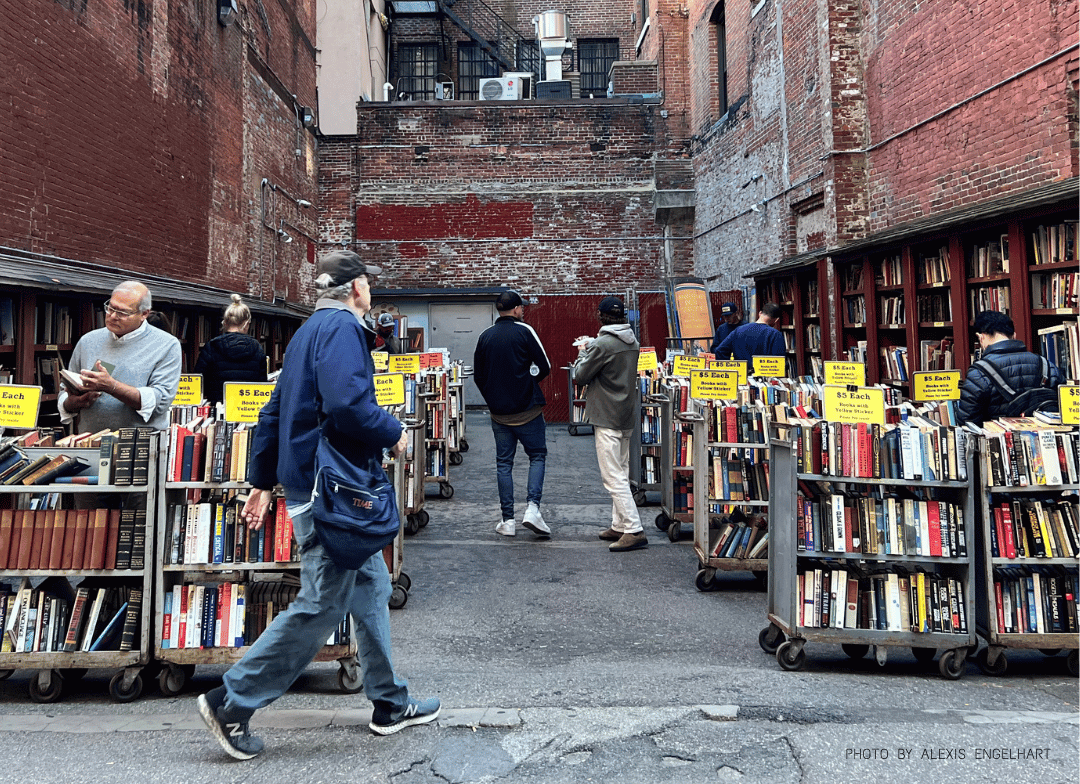Contest

Building healthier communities, working for a better tomorrow, and ensuring the well-being for all begins with trust. Trust is a cornerstone of public health, influencing an individual’s willingness to seek and maintain care, follow medical advice, engage in advocacy and preventative measures, participate in sustainable practices, and improve individual and community health, ultimately impacting health promotion, disease prevention, mental wellbeing, sustainable change, and the like.
What happens when trust is fractured? When systems fail, when misinformation spreads, when communities feel unheard—how do we restore connection, foster peace, and rebuild a sense of belonging in our communities in the midst of chaos?
Creativity—through art, letters, stories, and poetry—offers building trust with public health. It can be used to reimagine, transform, and understand how we all collectively shape the public health we want, allowing us to explore the narratives, including adversities and aspirations, which enhance our relationship with public health and its systems.
Trust in public health can be accomplished with trust-building solutions across generations, including ideas addressing hurdles, ideas identifying potential solutions, ideas that are genuine, ideas that foster connections in inclusive ways, and ideas that are impactful and resonate with all. Creative outlets can serve as the bridge between us all—individuals, communities, and health professionals and scientists alike—fostering understanding and connection in ways that statistics and policies alone cannot achieve.
What builds and restores trust? Is it empathy, love, accountability, and genuine communication? What fosters mistrust in public health? Is it a lack of transparency, failure to communicate well, limited diverse voices? How can we create peace and community through chaos? Creative expression can help us unpack these questions and envision solutions.
Using art, letters, stories, and poetry, tell us:
How might we build public health systems that are trustworthy?
How might we foster peace and strengthen community in the face of chaos?
Through creativity, whether as an individual, public health professional, or community member or leader, we can reimagine how public health engages with individuals, communities, and professionals, addressing issues like medical mistrust, systemic inequities, and misinformation while also envisioning a world where peace and connection triumph over chaos.
Let creativity lead the way—because trust, once built, once restored, or once reimagined together, can transform health and foster peace between individuals, communities, and the world.
Note: At this time, submissions will only be accepted if written in English. Submissions should not have been previously published and should be properly formatted with little to no grammatical errors. Submissions will be accepted via Submittable. Please do not include any identifying information in your uploaded file.
Artificial Intelligence (AI) Guidelines: Although AI represents a new and powerful tool, at LIGHT, we strive to maintain a magazine rooted in community and personal narratives. In other words, AI can be used as a tool, but it should not be the primary creator of your submission.
Entries into the LIGHT open call that utilize AI must:
- not exceed 10% utilization as determined by AI detection software
- credit and make explicit the use of AI in the submission
Authors of submissions that utilize AI and fail to meet both requirements will be notified, and their submission will be withdrawn from consideration. Please review this blog post for more information regarding our AI guidelines.

Deadline
The deadline for all submissions in each category is Thursday, May 15, 2025, by 11:59pm CST. All submissions should follow LIGHT guidelines on Submittable and the specified judging criteria.
Potential Timeline
– Open call launch: February 1, 2025
– Open call deadline: May 15, 2025
– Review and judging: May 2025
– Finalist notifications by: June 2025
– Expected magazine release: January 2026

Prizes
LIGHT awards three prizes: 1st place: $500, 2nd place: $375, and 3rd place: $125. The top three submissions in each of our four categories (art, letters, poems, and stories) receive a prize. The top contestants in each category will be notified early June 2025 and will be featured in the fourth issue of our magazine. All submissions will receive consideration for publication in the magazine dependent on the number and quality of submissions. Prizes for each category are as follows:
Prizes for each category are as follows:
Dear Public Health/or Letters to Public Health Prize
We believe letters are the truth of life. A space to cherish connections between the public and their health. We believe the public carries a gift for health so necessary to survival, and we come close to this gift through letters. Dear Public Health is for the public, written as a letter to make connections with the public and their health easier, not difficult. Public health experts are people who live in our society. The public lives in our society too. Public health is not something that should be left for experts only to shape. It should be for anyone, for everyone. Public health should not be something that the public cannot understand or use, but rather, it should be collaborative and co-created. So, we want your letters to help light up public health, to center the public in public’s health. Our top letter will win $500. The second-place winner will win $375, and the third-place winner will win $125.
PEN-3 Prize in Storytelling
We believe stories are a guide. They are always with us. As teachers, they evoke a feeling, leading us, helping us the reader to discover, to explore the public in public health. So, what is your story about health, about the public and their health? We all have stories in us. We want to learn about your careful observation of reality in public health and not just the negative aspects. We want to hear your stories that are existential or unique, and of course your positive stories. The PEN-3 (Positive, Existential, Negative) Prize in Storytelling is modeled after the PEN-3 cultural model developed by Dr. Collins Airhihenbuwa who suggested that public health should not only focus on things that are negative but also things that are unique and things that are great. We want your PEN-3 stories to light up our public’s health, to center the public in health. Our top story will win $500. The second-place winner will win $375, and the third-place winner will win $125.
Airhihenbuwa CO. Perspectives on AIDS in Africa: strategies for prevention and control. AIDS Educ Prev. 1989;1(1):57-69.
Poetry Is Not a Luxury Prize
We believe poetry is not a luxury. They put to words what we feel within and dare make real or bring into action, our fears, our pain, our power. They also probe the present, clarify the past, and enlighten the future. They help transform silence into action, engaging both emotionally and intellectually. We believe poetry can be used to shape the public’s health. Not as luxury as Audre Lorde once mentioned, but to scrutinize our lives, to bring change, to bring hope to lives long forgotten and excluded in public health. Poetry Is Not a Luxury Prize is based on Audre’s Lorde invitation to use poetry as a vital necessity of our existence, our hopes, our dreams towards survival and change, first made into language, then an idea, then action. So, poetry is not a luxury for us. It is a life and death affair that we believe can be used to light up the public’s health, to center the public in health. Our top poem will win $500. The second-place winner will win $375, and the third-place winner will win $125.
Lorde A. Poetry Is Not A Luxury. Osnabrück: Druck- & Verlagscooperative; 1993.
PEN-3 Prize in Storytelling
We believe poetry is not a luxury. They put to words what we feel within and dare make real or bring into action, our fears, our pain, our power. They also probe the present, clarify the past, and enlighten the future. They help transform silence into action, engaging both emotionally and intellectually. We believe poetry can be used to shape the public’s health. Not as luxury as Audre Lorde once mentioned, but to scrutinize our lives, to bring change, to bring hope to lives long forgotten and excluded in public health. Poetry Is Not a Luxury Prize is based on Audre’s Lorde invitation to use poetry as a vital necessity of our existence, our hopes, our dreams towards survival and change, first made into language, then an idea, then action. So, poetry is not a luxury for us. It is a life and death affair that we believe can be used to light up the public’s health, to center the public in health. Our top poem will win $500. The second-place winner will win $375, and the third-place winner will win $125.
Lorde A. Poetry Is Not A Luxury. Osnabrück: Druck- & Verlagscooperative; 1993.
Judging
Submissions will be reviewed by three to five independent judges. Judging criteria will include the following using a collaborative style of judging:
Innovation
Is the submission transformative? Does the submission offer a new way to rethink a public health issue?
Clarity of expression
Is the submission clearly expressed, narrated, or represented? Is the submission understandable?
Originality and creativity in expression
Does the submission show creative thinking? Does the submission stand out as unique and original?
Appeal of content
How well would the submission resonate with the public? Would the public find interest in the content?
Relevance to public health
Does the submission connect to the public health issue? How much significance does the submission offer to the public health field?
FAQ
Who is eligible to participate?
Anyone can participate! There is no age requirement for submission. Submissions can be US-based or international, but all submissions must be in English.
Should I include my name in my file I submit?
No, please do not include your name or any other identifying information in the file you submit. Your name will be documented in Submittable.
Is there a limit to how many pieces of work I can submit?
No, you can submit as many pieces of work as you want. At the same time, be mindful that quality of the work is more important than quantity.
Can I submit creative work that has been previously published?
No, your creative work cannot have been previously published. An exception would be if it has been published on a personal website, blog, Spotify, etc.
Can I submit to LIGHT and another contest simultaneously?
Yes, but if you are submitting concurrently, please tell us if your submission is accepted elsewhere. Your submission with LIGHT will have to be withdrawn.
Will my submission be shared publicly?
Yes, your creative submission could be published in the LIGHT magazine. Please only submit what you would like the public to see or read in our magazine. Your name will be published along with your submission.

